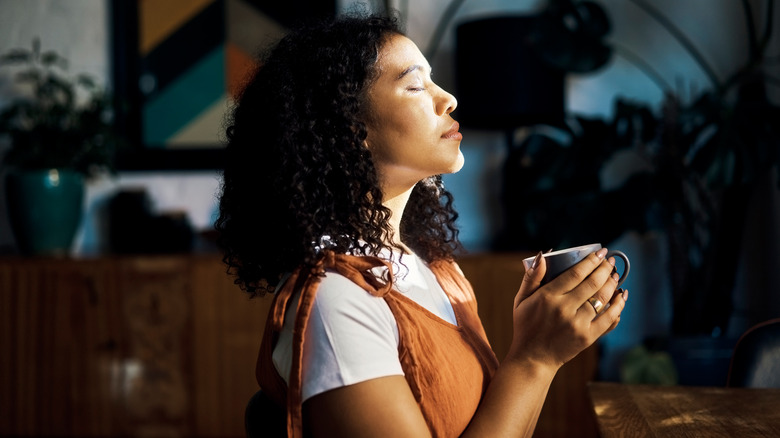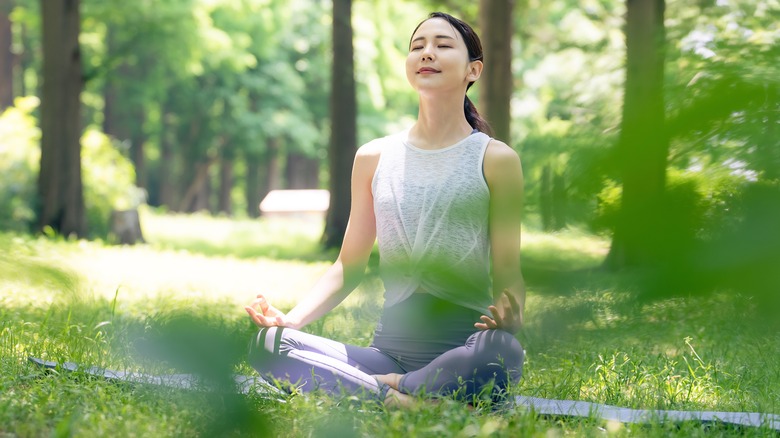We Asked Mental Health Experts What It Really Means To Practice Gratitude - Exclusive
We often come across the advice: "Focus on the positive. Be grateful for what you have. Live in the present moment." But how can we actually put this into action? What words and activities can truly evoke a sense of gratitude within us? And what's the importance of practicing gratitude anyway? "Gratitude allows us to turn toward our life instead of away," integrative and psychedelic medicine physician, Tanmeet Sethi, M.D., told Women.com.
From a spiritual perspective, practicing gratitude can elevate our mood by influencing our vibrations. "Gratitude is one of the highest vibrations and most powerful frequencies," quantum energy healer and spiritual mentor, Nicole Starbuck, told us. "As long as we're not 'spiritually bypassing' with toxic positivity, gratitude helps us to focus on what's working so we can bring more flow into our lives."
When people experience major life disruptions, they may turn to manifestation or prayer. They might imagine what it feels like to have the issue resolved in order to feel hopeful or calm in the situation. If the problem is resolved, they might say, "I'm so grateful." But according to experts, there is more to gratitude than just practicing it only after something good happens, as this makes gratitude conditional. Saying "I'm grateful because I got my dream job" is certainly distinct from simply feeling gratitude for something that isn't tied to personal gain. So, how do we cultivate this "attitude of gratitude"?
How does gratitude affect our health?
Gratitude brings about positive effects on mental wellness and overall contentment by redirecting attention toward the joyful facets of life. According to a study conducted by psychologists Dr. Robert A. Emmons and Dr. Michael E. McCullough, participants who documented what they were grateful for each week for 10 weeks had a contrasting sense of sanguinity compared to participants who noted their daily annoyances (via Harvard Health Publishing).
"Gratitude helps individuals reframe negative experiences, find meaning in adversity, and develop a sense of hope and optimism," clinical psychologist, Chelsea Sarai, Psy.D., told Women.com. With this in mind, practicing gratitude can serve as a coping mechanism for folks dealing with physical ailments, as it promotes hopefulness. Moreover, research has found that practicing gratitude actually promotes physical health, too. In a study performed by Paul J. Mills and Laura Redwine, individuals with higher levels of gratitude in a group of 185 participants reported improved sleep, reduced fatigue, a drop in levels of systemic inflammation, as well as decreased depression and increased self-confidence (via Greater Good Magazine).
"It helps train your brain to search for and acknowledge positive elements of life that may otherwise go unnoticed," licensed mental health counselor, Hannah Mayderry, M.Ed., told us. "When we are aware of the good in our life, we can tend to the bad without feeling hopeless."
Expressing gratitude to others vs. expressing it to ourselves
We often express thankfulness outwardly to others, but practicing gratitude inward can enhance our self-worth, such as saying "I'm grateful to myself for speaking up in that meeting" or "I'm grateful to myself for being assertive." But is personal appreciation as beneficial as expressing it in a relational sense?
"Self-gratitude is sometimes overlooked," clinical psychologist, Chelsea Sarai, Psy.D., told Women.com. "However, acknowledging and appreciating one's own accomplishments, strengths, and positive actions is important for self-care and well-being." Additionally, self-appreciation has been connected to body neutrality. A 2021 study published in the "Journal of Obesity" examined the link between body appreciation and self-esteem among university students in Oman. The study revealed a noteworthy correlation between an individual's body and self-admiration when asked questions that centered on appreciating their body regardless of weight, shape, or disabilities, thus, honoring the body's needs.
With rising cases of self-criticism, especially in the age of social media, self-appreciation is certainly a crucial component of mental health, but some experts affirm that gratitude is more effective when expressed in social settings. "Gratitude is most powerful when it's directed at the people around us — expressing gratitude and noticing the things that others do for us," Professor Laurie Santos at Yale University told Women.com. "That gives us a sense of belonging and can lead to the beneficial relationship effects that come from gratitude."
How can we practice gratitude when life is challenging?
Practicing gratitude can be difficult when life is challenging. Many people around the world are victims of war, survivors of abuse, battling diseases, and seekers of refuge in the most arduous circumstances. Unlike toxic positivity, where emotions are suppressed and suffering is ignored, the consensus from experts is that it's important to acknowledge pain and hardship when practicing gratitude. "Gratitude should not be used as a means to avoid underlying issues," Margaret C. Wang, MA, LMFT, told Women.com. "It should not be used to deny or invalidate one's pain."
It's also worth noting that gratitude is an attitude that takes time, hence the term "practice." It's an ongoing journey of personal growth that gradually becomes a habit, leading to a transformative perception of the world around us and ourselves in it. "Gratitude takes back your power after the world takes it away," Tanmeet Sethi, M.D., told us. "Gratitude recasting can help you consider what the oppressive circumstance revealed about you as a survivor."
Moreover, it's essential to emphasize that gratitude should never replace legitimate mental healthcare. Recognizing pain and suffering is crucial, but seeking support is equally important. "For those who might experience more guilt or shame triggered by these gratitude exercises, I generally wouldn't recommend [them]," said Wang. "Instead, it's really important that the person feels seen and heard. ... I would recommend practicing self-compassion or neutral statements towards oneself."
The difference between gratitude and appreciation
Some may struggle to identify the sensations of gratitude, unsure of what they're "supposed" to feel. "Physically, gratitude can feel like warmth in the body, a sense of being grounded, safe, and calm," mindset coach and hypnotherapist, Elyssa Desai, told Women.com. "When we feel grateful, we mentally experience a shift from harmful and negative thinking to more positive and supportive thinking." But is this the same as being in a state of appreciation?
"Appreciation can extend to both positive and challenging experiences, allowing us to find meaning and lessons even in difficult circumstances," acupuncturist and author Jenelle Kim, DACM, L.Ac., told us. "While gratitude is often directed towards specific objects or individuals, appreciation can encompass a broader sense of awe and wonder for life itself."
From a spiritual point of view, collective consciousness Abraham Hicks channeled by Esther Hicks, said the vibrational essence is different between gratitude and appreciation (via YouTube). According to them, gratitude is conditional, whereas appreciation is an emotional state with no conditions tied to it. For example, feeling grateful for finding love after longing for a partner is tied to the outcome of finding a partner, making it conditional. On the other hand, enjoying a beautiful sunset and appreciating it is unconditional as it doesn't depend on any personal gain or specific outcome. Furthermore, gratitude is often practiced when someone is in a "wanting" phase and desires a specific result, whereas appreciation is independent of a favorable outcome.
Tangible ways to practice gratitude
Finding dedicated moments for gratitude can be challenging amidst a busy life. Moreover, breaking free from skepticism surrounding this practice requires patience. But with tangible exercises, training your gratitude muscle for mental and physical benefits is possible.
- Journaling: Getting yourself a diary and journaling daily or weekly is a popular technique for getting into the attitude of gratitude. Begin by jotting down things that made you grateful that day. If life presents challenges, you may ask yourself: "What lessons can I draw from this experience?"
- Visual reminders: Clinical psychologist, Chelsea Sarai, Psy.D., recommended writing gratitude letters thanking others who you appreciate or assembling a gratitude jar with appreciation notes written on pieces of paper that you collect over time.
- Gratitude rituals: According to Jenelle Kim, DACM, L.Ac., commencing each morning with a moment of reflection on the things you're grateful for can establish a positive tone for the rest of the day.
- The 4-3-2-1 gratitude exercise: Celebrity hypnotherapist, Begum "B" Uz, recommends the 4-3-2-1 gratitude guide which involves thinking of four things you're grateful for that year, three things for that month, two for that week, and one for that day.
- Milk your happy thoughts: Make a list of things that make you feel good and then exaggerate those happy feelings, thus, creating a ripple effect of positive emotions. For example, if the traffic light turns green just as you approach it, relish that happy moment and record it in your gratitude journal.





